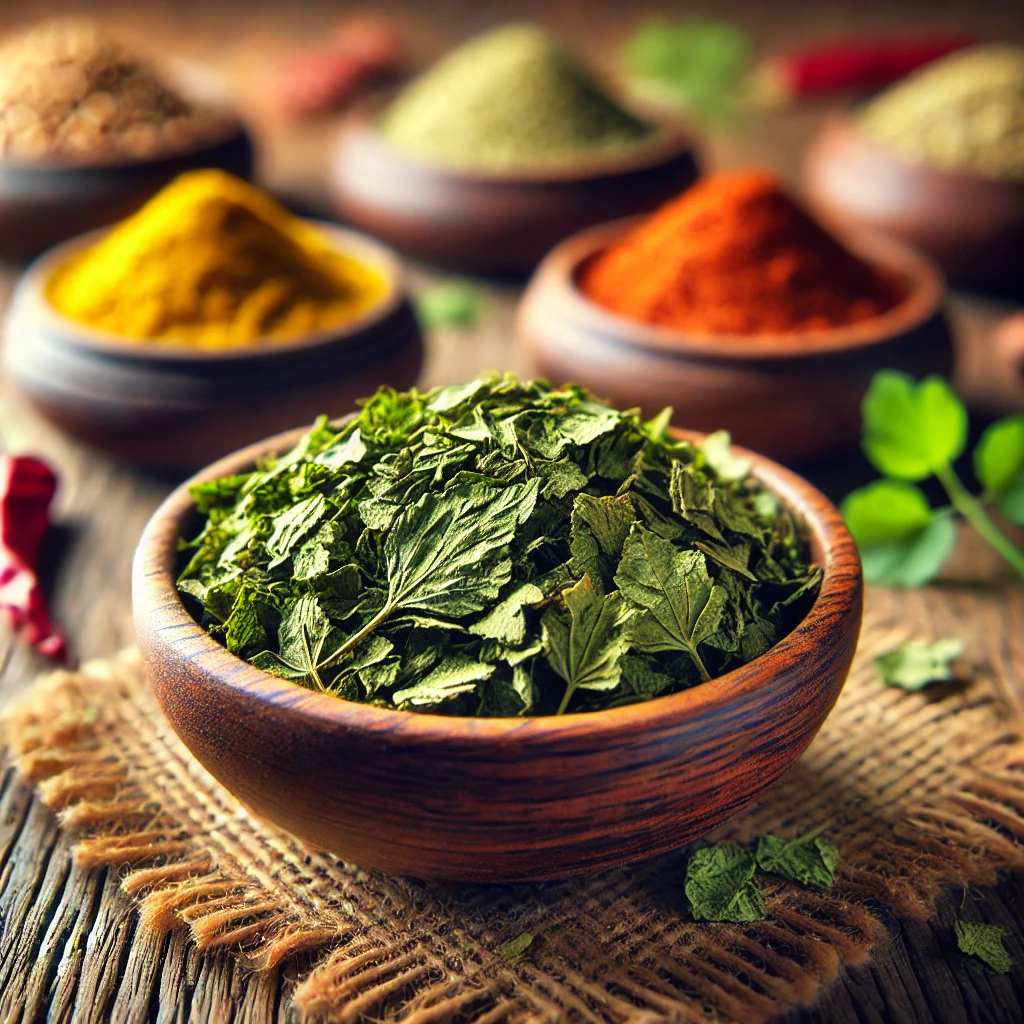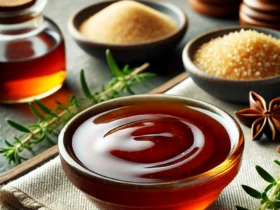Introduction
Kasuri Methi, also known as dried fenugreek leaves, is a popular herb used in Indian cuisine for its unique aroma and flavor. Named after the region of Kasur in Punjab, Pakistan, where it is traditionally grown, Kasuri Methi adds a distinctive taste to various dishes, making it a cherished ingredient in many kitchens.
What is Kasuri Methi?
Kasuri Methi refers to the dried leaves of the fenugreek plant (Trigonella foenum-graecum). The fresh leaves are often used in Indian cooking, but the dried form, known as Kasuri Methi, has a more intense flavor. It is characterized by its slightly bitter, nutty taste and a strong aroma that can transform a dish.
Culinary Uses
Kasuri Methi is a versatile herb that can be used in a variety of dishes:
- Curries and Gravies: It is commonly added to rich curries and gravies, such as butter chicken, paneer tikka masala, and dal makhani, enhancing the flavor profile with its earthy notes.
- Breads: The herb is often mixed into dough for Indian breads like naan, paratha, and thepla, imparting a subtle bitterness that complements the bread’s softness.
- Vegetable Dishes: It pairs well with vegetables like potatoes, cauliflower, and spinach, adding depth and complexity to simple dishes.
- Rice and Biryani: Sprinkling a small amount of Kasuri Methi on biryanis and rice dishes can elevate their taste, providing a fragrant and savory touch.
- Snacks and Savories: It is also used in making various Indian snacks, like pakoras and samosas, where it adds a burst of flavor.
Health Benefits
Kasuri Methi is not just a culinary delight but also offers several health benefits:
- Rich in Nutrients: It contains essential vitamins and minerals, including iron, calcium, and vitamins A and C.
- Digestive Aid: The herb is known to aid digestion and is often used in traditional remedies to alleviate digestive issues.
- Anti-Inflammatory Properties: Fenugreek leaves have anti-inflammatory properties, which can help reduce inflammation in the body.
- Blood Sugar Regulation: Some studies suggest that fenugreek can help in managing blood sugar levels, making it beneficial for people with diabetes.
How to Use Kasuri Methi
To use Kasuri Methi in cooking, it’s best to crush the dried leaves between your palms to release their flavor and aroma before adding them to a dish. It is typically used in small quantities due to its strong flavor. Adding it towards the end of cooking helps preserve its delicate aroma.
Storage
Kasuri Methi should be stored in an airtight container in a cool, dry place, away from direct sunlight. Proper storage can help retain its flavor and aroma for an extended period.
Conclusion
Kasuri Methi is a prized herb in Indian cuisine, known for its aromatic and flavorful contribution to dishes. Its versatility, along with its health benefits, makes it a valuable addition to any kitchen. Whether you’re a seasoned cook or a culinary enthusiast, experimenting with Kasuri Methi can enhance your dishes and introduce you to the rich flavors of Indian cuisine.
Kasuri Methi FAQ
1. What is Kasuri Methi?
Kasuri Methi, also known as dried fenugreek leaves, is a herb used in Indian cuisine for its distinct aromatic and slightly bitter flavor. It is derived from the fenugreek plant and is commonly used in a dried form.
2. How is Kasuri Methi used in cooking?
Kasuri Methi is often used in small quantities to flavor a variety of dishes, including curries, gravies, breads, and snacks. It can be sprinkled over dishes or added to doughs and batters. Crushing the dried leaves before use can help release their aroma and flavor.
3. What does Kasuri Methi taste like?
Kasuri Methi has a unique flavor profile that is slightly bitter and nutty, with a strong, aromatic scent. It adds depth and complexity to dishes, making it a popular ingredient in Indian cooking.
4. Can Kasuri Methi be used fresh?
While Kasuri Methi specifically refers to the dried leaves, fresh fenugreek leaves can also be used in cooking. However, the flavor of fresh leaves is milder compared to the dried version.
5. What are the health benefits of Kasuri Methi?
Kasuri Methi offers several health benefits, including:
- Nutrient-rich: It contains vitamins and minerals like iron, calcium, and vitamins A and C.
- Digestive Aid: It helps in digestion and can relieve digestive issues.
- Anti-Inflammatory: The leaves have anti-inflammatory properties.
- Blood Sugar Regulation: Fenugreek is known to help manage blood sugar levels.
6. How should Kasuri Methi be stored?
Kasuri Methi should be stored in an airtight container in a cool, dry place away from direct sunlight. Proper storage helps preserve its flavor and aroma.
7. Can I substitute fresh fenugreek leaves for Kasuri Methi?
Yes, fresh fenugreek leaves can be used as a substitute, but the flavor will be milder. If using fresh leaves, you may need to use a larger quantity to achieve a similar taste.
8. Is Kasuri Methi the same as methi seeds?
No, Kasuri Methi refers to the dried leaves of the fenugreek plant, while methi seeds (fenugreek seeds) are the seeds of the same plant. Both have distinct flavors and are used differently in cooking.
9. How can I reduce the bitterness of Kasuri Methi?
To reduce the bitterness, you can soak Kasuri Methi in water for a few minutes and then drain it before adding it to your dishes. This helps mellow the bitter taste.
10. What dishes commonly use Kasuri Methi?
Kasuri Methi is used in a variety of Indian dishes, including butter chicken, paneer dishes, dal, parathas, and various snacks. It is also sprinkled over biryanis and pulaos for added flavor.







Leave a Reply